Of all American success stories, the system that supplies food in abundance should be at the top of the list. As with all large and complex systems, however, there are a number of key features of the food system that require urgent attention.
Today UCS is releasing a short video that will walk you through some of these food system problems and ask you to join our call for the next President to take the lead in solving them.
The good news is that these features of the system can be addressed—with vision and leadership—because we can name them and we know what would be better:
- What we produce should make us healthy: To the extent that the government invests in research, development, infrastructure, education, outreach to farmers and in market promotion, those investments should be aligned and coordinated to produce greater public wellbeing. It is very handy that our government, through the departments of Agriculture and Health and Human Services, produce and regularly update a set of dietary guidelines with the latest nutritional and health science to serve as a template to align these objectives.
- How we produce should be safe and sustainable: Agricultural science has identified ways to produce abundantly and in ways that regenerate soil, clean water and nutrients, and minimize other harmful environmental effects, such as generating greenhouse gases. Transferring this knowledge to farmers and supporting them to farm in an environmentally sound manner will be better for them and for all of us. Farmers and the government can save money, and all of us can live, work and play in a cleaner, more healthful environment.
- Healthy food is a necessity not a privilege: All people need nourishing, healthful food, and such food should therefore be physically and economically accessible to all. In a free and democratic society, the benefits of a system that exists due to large public investment ($100 million annually) should accrue to all of us. This has two components:
- The people who produce, harvest, process, serve and clean up after we eat should enjoy the same worker protections all of us expect, and should earn livable wages that allow their families to enjoy the literal fruits of their labor.
- The food that has the smallest ecological footprint, is produced with fewer external inputs, and is least processed, should be the most affordable, by market dynamics. Our official policies should not be inequitable, to either domestic farmers and eaters, or to developing country farmers and eaters.
How can we change things?
Americans can be justifiably proud of the bedrock value that “nothing is ever good enough,” and that we can always figure out how to make things better. While the current food system produces abundantly for those of us who can afford it, it contributes toward creating an unhealthy environment, one that features artificially cheap “choices” (Which greasy burger? Which greasy pizza? Which sugary soft drink?) that make us and keeps us sick. And the system as currently practiced, promoted and subsidized exploits both people and nature. We are a better people and nation than that. Agricultural, nutrition and health science exist to make things better. And we all want things to get better.
Cross-partisan polling tells us that Americans understand that there is a food system, that the current system benefits some of us but makes most of us sick, that while healthful food is abundant it is price out of range for many of us, that government policies play a heavy role in making things this way, and—most importantly—that an overwhelming majority of people across the political spectrum would vote for a president who prioritizes improving the food system.
The common thread among all the issues requiring attention to improve the food system is that they are matters of policy. Congress is responsible for producing the closest thing we have to a farm and food policy, the quinquennial “Farm Bill,” and that is the policy that has largely given us the problematic system we have. To shift things, we will need executive leadership to inspire, define and implement a new way of doing things that better befits Americans and reflects the current state of scientific and health knowledge.
There is political tailwind to support the first presidential candidate to realize that by fixing food many other high priority issues can also be fixed.
For this reason, we are collaborating with Food Policy Action and the HEAL Food Alliance on the Plate of the Union initiative to urge all presidential candidates to include better food policy in their political platforms. Join us, for farmers, farm workers, thriving “good food” businesses, healthy families, a cleaner environment, and a flourishing nation of which we can all be proud.
None of this will be possible unless we fix food first.
